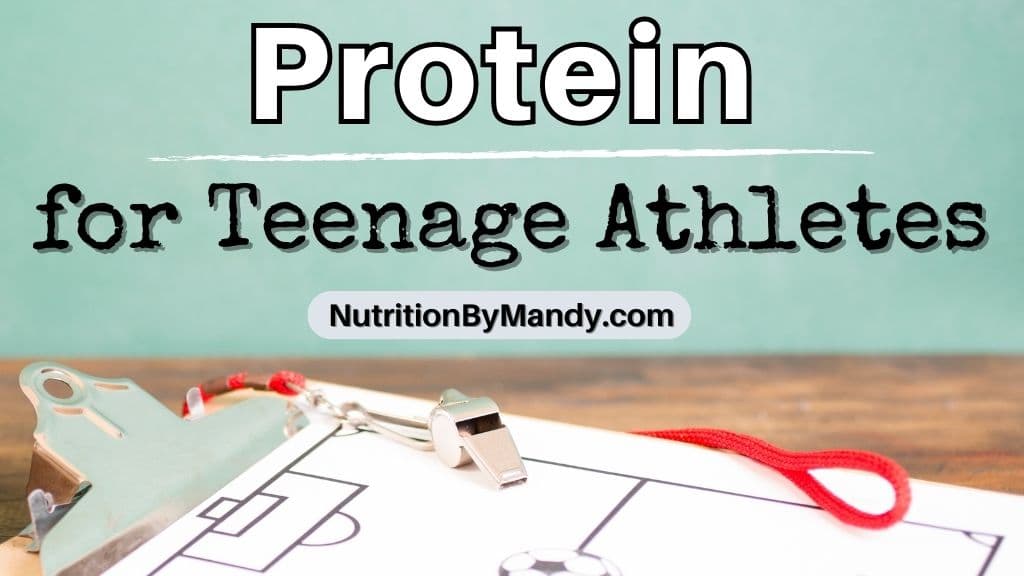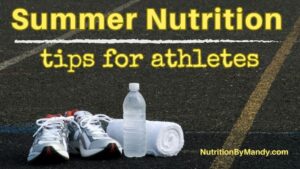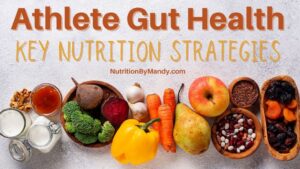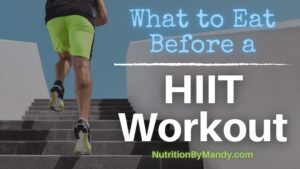Last Updated on December 2, 2023 by Mandy Tyler, M.Ed., RD, CSSD, LD
Protein for Teenage Athletes
Teenage athletes commonly ask how much protein they need to consume to support their performance goals. Let’s take a look at the protein requirements for teenage athletes. Then we will explore easy ways to add protein to a teenage athlete’s meals and snacks.
Nutrition Needs of Teenage Athletes
Prior to considering protein needs for teenage athletes, it is important to first ensure the teen is consuming adequate calories in their diet. If a teen is not consuming enough calories to support health, growth, development, and daily physical activity, the protein consumed in the diet may be broken down and used for energy (1, 2).
Thus, teenage athletes first need to make sure they are consuming enough calories in their diet to support their daily energy needs. This then allows for the protein that the athlete consumes to be utilized for its primary purposes, such as building and repairing muscle mass (1, 2).
Protein Requirements of Teenage Athletes
Although there is limited research in the adolescent population, general recommendations are for athletes to consume ~ 0.3 grams of protein/kg body weight with each meal or snack (1, 2, 3). This calculates to be in the range of 15-25 grams of protein at each eating occasion; with larger athletes needing more protein than smaller athletes.
If the protein is spread over three meals and two snacks (5 eating occasions), the daily protein intake would be in the range of 1.5 g/kg/day (2). As a reminder, eating protein alone will not result in an athlete gaining muscle mass. For athletes to build muscle, protein intake must be combined with a well-planned strength and conditioning program.

Easy Ways to Increase Protein for Teenage Athletes
Let’s now explore ways to help teenage athletes meet their protein needs at meals and snacks.
Adding Protein to Breakfast for Teenage Athletes
It is not uncommon for teenage athletes to grab a quick breakfast on the way out the door. Thus, it can be helpful for teens to have easy ideas for ways to add protein to breakfast on-the-go.
Ideas for adding protein to breakfast include:
- Fruit smoothie
- Eggs, hard-boiled eggs
- Individual containers of Greek yogurt or cottage cheese
- High-protein milk
- String cheese, cheese sticks, sliced cheese
- Turkey or chicken sausage
- Nuts, nut butters
- Ham, turkey, grilled chicken
- Protein pancakes or waffles (i.e., Kodiak Cakes®)
- Protein overnight oats

Protein for Teenage Athletes Following a Plant-Based Diet
It is important for teenage athletes following a vegetarian or vegan diet to have ideas for how to meet their protein needs at breakfast. Here are several options to consider.
- Soy milk, soy yogurt, tofu
- Plant-based, high-protein milk
- Vegan egg substitutes
- Nuts, nut butters
- Seeds, seed butters
- Quinoa (use in breakfast bowl)
- Beans, hummus
Adding Protein to Lunch and Dinner for Teenage Athletes
Similar to breakfast, teenage athletes need to ensure the meals they enjoy at lunch and dinner contain lean sources of protein as well.
Quick and easy ways to add protein to a teenage athlete’s lunch and dinner include:
- Shredded rotisserie chicken
- Pre-cooked, frozen chicken or steak fajita meat
- Pre-cooked, frozen Italian turkey meatballs
- Single-serving pouches of tuna or salmon
- Deli meat: Turkey, chicken, ham, roast beef
- Reduced-fat sliced cheese, string cheese, cheese sticks
- Tofu, tempeh, seitan
- Edamame, beans, lentils, hummus, seeds, quinoa
- Hard-boiled eggs
- Nuts and nut butter
High-Protein Snacks for Teenage Athletes
In addition to well-planned meals, teenage athletes should enjoy healthy snacks that can provide energy for daily activities and support their protein needs. I encourage athletes to view snacks as “mini-meals” in which they combine a carbohydrate-rich food item with a food containing lean protein.
Easy “mini-meal” snack ideas for teenage athletes include:
- Beef or turkey jerky with granola bars
- Peanut butter and jelly on whole wheat bread
- Hard-boiled eggs with grapes
- String cheese with pretzels
- Greek yogurt with berries and granola
- Cottage cheese with pineapple
- Hummus with pita chips
- High-protein milk with fig bars
- Chocolate milk with graham crackers
- Turkey and cheese wrap
- Nut butter with apple slices
- Almonds with breakfast bars
- Roasted chickpeas with dried fruit
- Edamame with whole grain crackers
If a teenage diet needs to follow a gluten-free diet, there are a variety of ways they can incorporate gluten-free snacks with protein into their diet. Check out my blog on high-protein gluten free snacks for a variety of snack ideas that athletes can enjoy.

Protein Drinks for Teens
In addition to food, teenage athletes can help support their protein needs by consuming nutritious beverages with meals and snacks.
Milk for Teenage Athletes
Low-fat or high-protein milk are both great options for teenage athletes. Milk is a source of high-quality protein. A high-quality protein provides all of the essential amino acids that our bodies cannot produce. The body can efficiently utilize high-quality proteins to build muscle in the body (4).
Milk also provides 13 essential vitamins and minerals, including calcium and Vitamin D, that are important for supporting a teenage athlete’s health and well-being.
What is High-Protein Milk?
High-protein, ultra-filtered milk goes through a filtration process that removes the lactose. This results in a lactose-free milk that has a concentrated protein and calcium content. For example, a cup of Fairlife® ultra-filtered milk has 13 grams of protein, compared to 8 grams of protein in a cup of regular milk.
Enjoying a cup of high-protein milk is an easy way for a teenage athlete to boost the protein content of a meal or snack.
Protein Shakes and Smoothies for Teenage Athletes
Teenage athletes can also enjoy shakes and fruit smoothies to assist with meeting their protein needs. To boost the protein content of the drink athletes can add ngredients such as high-protein milk, Greek yogurt, cottage cheese, tofu, and nut butters.
Protein Powders for Teenage Athletes
If a teenage athlete is considering a protein powder it is important to understand that supplements are not regulated by the Food and Drug Administration in the same way that food is. Dietary supplements may contain banned substances that could potentially make you ineligible for competition.
Due to this, it is important for athletes to look for supplements that have been third-party tested. Supplements that are third-party tested have an outside organization evaluate the supplement for accuracy of ingredients. Two companies that evaluate sports supplements are NSF International Certified for Sport and Informed Sport.
Although protein powders may be a convenient option when time is limited, they should not replace real food in the diet. Keep in mind that there are plenty of ways to add protein to a shake with food sources that provide additional nutrients aside from just protein.

Protein for Teenage Athletes
You are now set with a variety of ideas for meeting the protein needs of teenage athletes. By consuming well-planned meals and snacks, teenage athletes can ensure they are optimally fueled to support their sports nutrition goals.
For additional tips to support teen athletes, check out my blog: Sleep for Teenage Athletes.
Join the Nutrition By Mandy Email List & Get a Free Athlete’s Grocery List
Click HERE to join the Nutrition By Mandy e-mail list. When you join you will receive a free athlete’s grocery list to print and take with you to the store.
About the Author
Mandy is a Sports Dietitian Nutritionist in the San Antonio, TX area. She is a Registered and Licensed Dietitian, a Board-Certified Specialist in Sports Dietetics, a Licensed Athletic Trainer, and is a Certified Exercise Physiologist through the American College of Sports Medicine. Mandy has experience working with athletes at the high school, collegiate, and professional levels. She believes the key to reaching one’s full potential, both in everyday life and in sports performance, relies on a healthy nutritional foundation. Learn more about the work Mandy does here.






